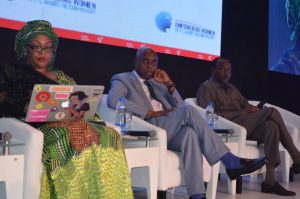-

L-R: Minister of State for Transportation, Hon. Gbemisola Saraki, Minister of Transportation, Hon. Rotimi Amaechi and the Permanent Secretary of the Ministry of Transport, Mr. Sabiu Zakari; during the 2019 World Maritime Day celebration in Lagos, yesterday. More women needed in dredging, marine survey – Saraki
- Women deserve equal rights and opportunities – Anishere
By Kenneth Jukpor
As the International Maritime Organization (IMO) dedicated 2019 World Maritime Day celebration to empowering women, Nigeria’s Minister of Transportation, Hon. Rotimi Amaechi has admonished Nigerian women to close the gap between the rich and the poor.

Amaechi, who was speaking during an event to mark the World Maritime Day in Lagos yesterday with the theme; “Empowering Women in the Maritime Community” stated that majority of the women in dire need of empowerment were living in poverty across the nation.
“How many of us have taken strategic steps to empower and uplift Nigerian women. It’s not about empowering the women in here, but those living in harsh conditions out there. We should be talking about uplifting those living in poverty and facing tough economic challenges. That’s what politics is about. It’s about lifting millions of persons out of poverty and not creating few billionaires”, Amaechi said.

Meanwhile, rather than beg for more opportunities, the Minister of Transport urged women in the maritime sector to develop their capacity to enable them qualify for higher positions in their respective fields.

Describing women to be ‘manipulators’ naturally, he said that a little effort to develop themselves would see them occupy any position they aspire for in any sector.
However, the Minister of State for Transportation, Hon. Gbemisola Saraki stressed that women were not begging. She lamented that some Nigerian men wouldn’t give women opportunities even when they deserve it on merit.
“The point we are trying to make is that everything should be on merit. Someone asked the Minister via a text message if all men who are in several positions are there based on merit. We know that not all the men in these positions deserve to be there. The issue is that there are certain people in the society who are disadvantaged. There are prejudices, whether it is religion, tribe or gender. This problem exists and that’s why the International Maritime Organization (IMO) has focused on this” Saraki said.
While she frowned at all forms of gender-based marginalization, she stressed that the issue of women empowerment wasn’t only about appointments or 35% inclusion, but appointments, employment and involvement in maritime businesses.
“If we want women to be inclusive, it has to be inclusive in appointments, employment and business. In maritime, as far as I’m concerned women businesses should be part of those who would do dredging, survey and possibly 5%-10% of all Federal Government contracts via all the agencies. By doing this, we would encourage them. There are many women who are already engineers but can’t breakthrough. Apart from that, we would also motivate young girls to be encouraged that this is something they can do”, she added.
Meanwhile, the President of African Women in Maritime (WIMAFRICA) Barr. (Mrs.) Jean-Chiazor Anishere harped on the need for Nigeria and other African nations to key into the commendable efforts of the IMO by ensuring that men and women have equal rights and opportunities.
Anishere said, “IMO is putting in such great efforts, we should also not relent in making sure that women are given equal rights as men. We need to take it upon ourselves to empower each and every citizen to take care of the oceans and enable all women play transformative and ambitious roles in understanding, exploring, protecting and sustainably managing our oceans”
While she noted that women engage in all aspects of ocean interaction, she lamented that women’s contribution to ocean-based livelihoods like fishing and conservation efforts are still invisible as gender inequality persists from the marine industry even to the field of ocean science.
“We should erase from our hearts the long misplaced perception that women are not suitable for working onboard ships, due to the nature of seafaring. We should also remove structural barriers and build good networks and above all, support quality education to ensure that no woman or girl is left behind in the maritime sector where women remain significantly under-represented” she said.
 MMS PLUS NG – Maritime, Aviation, Business, Oil and Gas News Online Newspaper with coverage in Maritime, Oil and Gas, Aviation, Power and Energy as well as Financial News
MMS PLUS NG – Maritime, Aviation, Business, Oil and Gas News Online Newspaper with coverage in Maritime, Oil and Gas, Aviation, Power and Energy as well as Financial News









